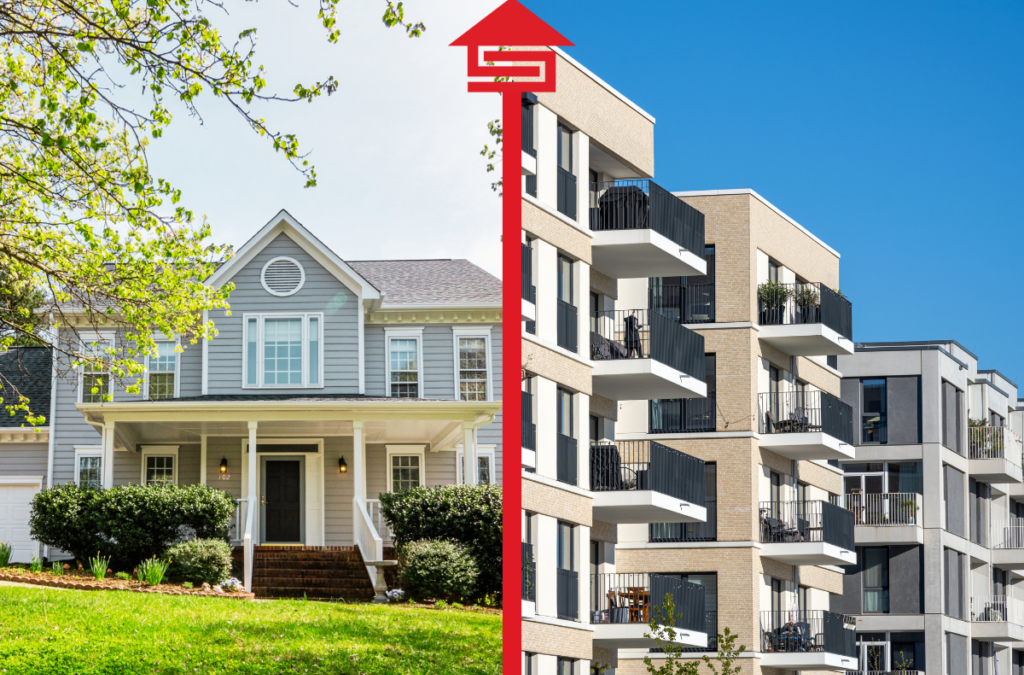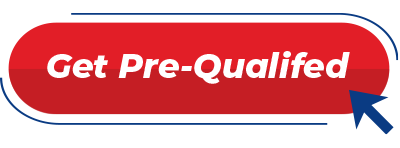
by First Integrity Team Supreme Lending | Mar 25, 2025
Discover the Key Differences Between a Condo vs. Single-Family Home
So you’ve finally decided to end the debate of renting vs. owning a home and pull the trigger on your homebuying journey. Congratulations! The next big question is deciding what kind of property you want to purchase—a condo vs. single-family home. Both options offer the potential to build equity, but the right choice comes down to your lifestyle, budget, and long-term goals.
To help you decide, here’s an overview the pros and cons of each option and how Supreme Lending may help you finance your dream home, whether it’s a condo or a single-family house.
Pros & Cons of Buying a Condo
Pros
- Lower Maintenance. One of the biggest benefits of condo living is that most exterior maintenance and landscaping are handled for you by the Homeowners Association (HOA). If you’re looking for a lower-maintenance lifestyle where you can focus on enjoying your space without the hassle of yard work or home repairs, you may want to consider a condo.
- Amenities. Many condo communities offer shared amenities such as pools, gyms, and clubhouses. This can provide luxurious perks without the extra cost of maintaining the amenities yourself.
- Affordability. In general, condos may be more affordable than single-family homes. For this reason, they are a great option for first-time homebuyers or those looking to downsize. If you’re trying to buy in a competitive housing market, a condo may offer a more budget-friendly option to open the door to homeownership.
- Location. Condos are often located in urban areas or desirable neighborhoods with easy access to dining, shopping, and public transportation. If you enjoy the vibrancy and convenience of city living, a condo can put you right in the action.
Cons
- HOA Fees. While HOAs manage the maintenance of shared spaces and amenities, that comes with a monthly cost. These fees can add up, and it’s important to factor them into your budget when considering the overall homebuying costs.
- Limited Privacy. Since condos are often in multi-unit buildings, you’ll likely be sharing a wall with neighbors. If privacy and quiet are important to you, this is something to consider.
- HOA Restrictions. HOAs typically have rules regarding what you can and cannot do with your unit, from the color of your front door to controlling whether you can rent it out. While these rules are put in place to help maintain the property’s value, they may also limit your freedom.
Pros & Cons of Buying a Single-Family Home
Pros
- More Space. Single-family homes typically offer more living space, both indoors and out. If you need room for a growing family, pets, or hobbies, or simply enjoy having a larger yard, a house may give you the space and flexibility you need.
- Privacy. Unlike condos, single-family homes can provide more privacy since you wouldn’t be sharing a wall with your neighbors. If peace and quiet are priorities, a standalone house may be your answer.
- Freedom to Personalize. As a single-family homeowner without an HOA, you have the freedom to make changes and renovations to your home. Want to build a deck, repaint your exterior, or add on more square footage? You would have the flexibility to do so.
- Suburban and Rural Living. Many single-family homes are located in suburban or rural areas. This may offer a quieter, more relaxed lifestyle away from the hustle and bustle of city life.
Cons
- Maintenance Responsibilities. With the freedom of owning a standalone property comes the responsibility for home maintenance, repairs, and upkeep. From mowing the lawn to fixing a leaky roof, you’ll be responsible for keeping everything in good condition.
- Higher Cost. Oftentimes, single-family homes may be more expensive than condos, both in terms of purchase price and ongoing costs such as property taxes, insurance, and utilities. Be sure to keep those additional costs in mind when deciding to buy a condo vs. a single-family home.
- Location. While one of the perks of single-family living is being in a more suburban or rural area, that also means you may be father away from city centers. This could result in a longer commute or less access to urban amenities.
How Do You Decide?
When choosing between a condo vs. a house, here are four helpful considerations:
- Lifestyle. Do you prefer a low-maintenance, lock-and-leave lifestyle with shared amenities? Or do you value privacy and space to personalize your property? You daily routine and personal preferences should guide your decision.
- Budget. While condos may have lower upfront costs, you’ll need to factor in HOA fees. On the other hand, single-family homes may require more financial investment in terms of ongoing maintenance.
- Location, Location, Location. Think about where you want to live. Do you prefer the convenience of urban life? Or do you dream of a suburban or rural retreat? The location has a direct impact on your lifestyle and commuting needs.
- Long-Term Goals. If you’re planning to grow your family, need extra space for hobbies, or want the freedom to make home improvements, a single-family property may make more sense. But if convenience and lower maintenance are calling your name, a condo may be the right fit.
The Benefits of Homeownership – No Matter What You Choose
Whether you opt for a condo or a standalone home, you’ll still enjoy all that homeownership has to offer. Owning your own place may give you the potential to build equity and financial stability. You’ll also have the flexibility to create a space that truly reflects your personality and lifestyle. Plus, homeownership has the potential to provide long-term rewards, as your property may appreciate in value over time.
Supreme Lending Has You Covered
Ranked as a 2024 top 15 retail lender in the country by Scotsman Guide, Supreme Lending has a wide range of mortgage options to help put people into homes—whether it’s a condo or single-family. Whatever your dream of homeownership may look like, we’re here to help with your home financing needs.
Ready to get started? Reach out to our team today!
Related Articles:
by SupremeLending | Jun 13, 2024

Condo financing is an exciting and rewarding experience, especially if you’re looking to purchase a dream home with low maintenance and community amenities. It’s important to understand how condo loans work to make an informed decision in your homebuying journey. Let Supreme Lending help guide you through the condo financing process. Explore the steps involved, go over frequently asked questions about condo loans, and discover perks of condo living.
What Is a Condo Loan?
Condo financing is similar to traditional mortgages but comes with a few unique factors. A condo loan is specifically designed for purchasing a condominium unit. Lenders handle condo loans slightly differently due to the shared ownership structure and the condo association, also known as the homeowners’ association (HOA).
When applying for a condo mortgage, lenders will not only consider your credit report and financial profile but also the condition and management of the condo complex. This includes the association’s budget, reserves, and overall governance. A condo loan covers the unit itself and may include additional fees associated such as HOA dues.
Condo Financing Process
Here’s a quick, step-by-step guide of how condo financing works.
1. Get Pre-Qualified.
As with any mortgage, typically the first step is pre-qualification or pre-approval. This helps you understand how much home you may be able to afford and shows sellers you’re a serious, capable buyer.
2. Find the Right Condo.
Once you know your budget, search for condos that fit your preferences, location, and lifestyle. Ensure the condo is on a lender-approved list or can meet lender requirements.
3. Apply for a Loan.
Submit your full mortgage application with all required documentation, such as income verification, credit history, and details about the condo.
4. HOA Condo Review.
The lender will review the condo HOA’s financial statements, bylaws, insurance policies, and reserve funds to ensure the property is a sound investment and isn’t deemed high risk.
5. Appraisal and Inspection.
An appraisal will determine the condo’s market value, and a home inspection will help identify any potential issues with the property, such as safety hazards or systems that may not be working properly.
6. Close on the Loan.
Once all criteria are met, you’ll proceed to closing where you’ll sign the necessary documents and transfer ownership of the condo. Congratulations, you’re a condo owner!
Condo Financing FAQs
How does condo financing differ from traditional mortgages?
While similar to a conventional mortgage, a condo loan requires additional review of the condo association’s finances, bylaws, and occupancy rates. This will ensure lenders that the complex is stable and well-managed, which helps mitigate lending risks.
What’s the difference between warrantable and non-warrantable condo loans?
A warrantable condo means that the complex meets the criteria set by Fannie Mae and Freddie Mac, the government-sponsored enterprises (GSEs) that purchase and guarantee mortgages from lenders. A warrantable condo typically has at least 50% of units that are owner-occupied or second homes, and the homeowners’ association management is financially secure. Non-warrantable condos do not meet these guidelines.
Can I still finance a non-warrantable condo?
Yes. Borrowers may face unique challenges when it comes to financing non-warrantable condos, condotels, and co-ops. However, Supreme Lending offers a wide range of condo loan programs, including non-warrantable condos and FHA spot approval processing.
Can I use an FHA or VA loan to buy a condo?
Yes. There are options to finance condos through FHA or VA loans. However, the condo complex must be on an approved list by the FHA or VA. If it’s not approved by the FHA, Supreme Lending may be able to provide FHA Single-Unit Approvals to help get a condo unit approved quicker.
Are interest rates higher for condo loans?
Interest rates for condo loans may be slightly higher than single-family mortgages due to the perceived higher risk. However, rates vary based on market conditions, credit score, and individual lenders, so be sure to work with an experienced, professional Loan Officer to go over your options.
Does Supreme Lending have an in-house condo loan team?
Yes! Supreme Lending has a dedicated, in-house Condo Project Review team to manage the condo financing process. This includes reviewing the complex and HOA to make sure the property’s guidelines are met.
Benefits of Condo Living
- Community Living. Condos often foster a strong sense of community, providing ample opportunities to meet neighbors and participate in social activities.
- Lower Maintenance. The Condo’s HOA typically handles exterior maintenance such as landscaping and select repairs, freeing you from traditional homeownership responsibilities.
- Condos can offer several amenities such as swimming pools, gyms, and recreational areas, allowing you to enjoy these perks without the personal investment or upkeep.
- Prime Locations. Condos are often located in desirable, urban areas, offering convenient proximity to work, entertainment, and dining options.
Condo financing can unlock the door to a vibrant and accessible lifestyle. By understanding the ins and outs of the condo loan process, you can be equipped with knowledge and power to make informed decisions. At Supreme Lending, we’re here to help guide you through every step of condo financing.

by SupremeLending | Feb 21, 2024

Condominiums—commonly known as condos—are a great option for homebuyers looking for less maintenance, urban settings, lock-and-leave lifestyle, and community amenities. But the differences between financing condos and single-family homes may bring more complexity to the condo loan process.
Condos are privately-owned units within a building where residents have ownership of their interior space and share ownership of common areas and exterior space (i.e., pool, roof, landscaping). Condo buildings are typically managed by a homeowner’s association (HOA). Upkeep of the common areas can be funded through monthly HOA fees, which are in addition to a resident’s mortgage payment.
The condo loan process typically considers several more factors than the process for a single-family home. Down payment minimums and interest rates may be higher for condo loans too. When financing a condo, lenders will not only look at the buyer’s financial history but may also evaluate the condo community’s condition and finances.
Several types of loans have requirements that condo associations must meet for a lender to be able to provide financing, which identify the condo as “warrantable.” If a condo property doesn’t follow specified guidelines, lenders, including Supreme Lending, can offer condo loan options for non-warrantable properties if eligible. Condo loan options include Conventional, FHA, VA, and new construction.
While the condo loan process may be more complex, Supreme Lending has an experienced in-house Project Review Office team dedicated to helping speed up the process by gathering and processing required documents for condo loans for a smooth homebuying experience.
Are you looking to finance a condo now or in the future? Contact your local Supreme Lending branch to get started.





